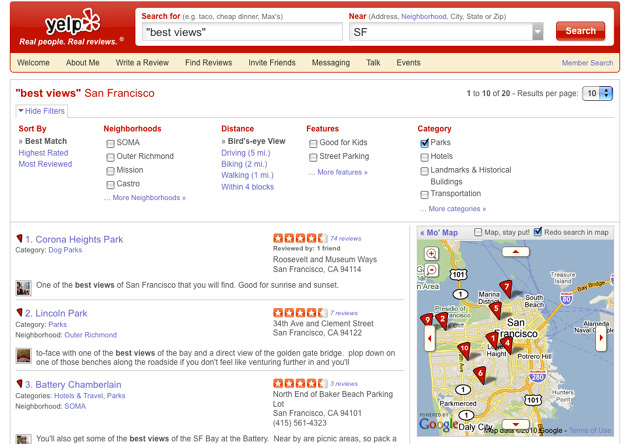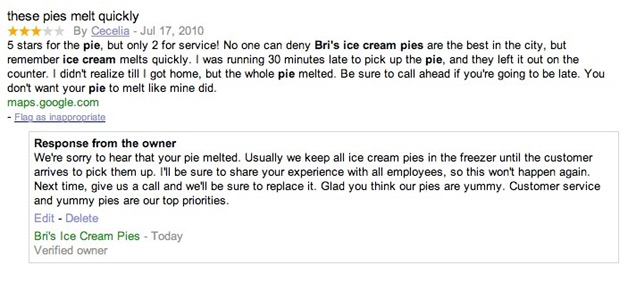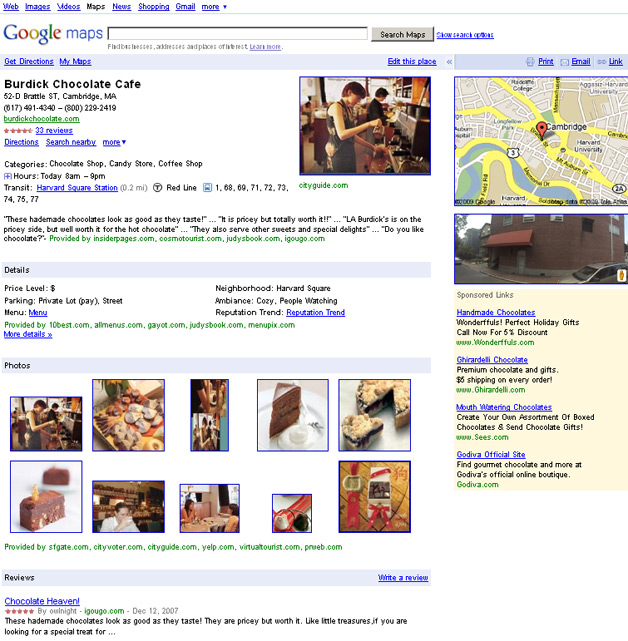Google and Yelp have had some issues for sometime, following a failed acquisition attempt, but it’s rare that the tensions between the two companies are aired for an audience. That is just what happened at TechCrunch’s Social Currency Crunchup event.
Would you be happy with the level of Google visiblity Yelp gets? Let us know.
Yelp CEO Jeremy Stoppelman and Google VP of Product Management John Hanke shared a stage and talked a bit about their situation. TechCrunch’s MG Siegler shares his account of the experience here. Essentially, what it boils down to is that Yelp isn’t thrilled with Google showing its content on Google Places, which the company is heavily pushing these days. Yelp accounts for a significant amount of the information Google shows on its Place pages. Siegler writes:
Yelp can’t like that too much. In fact, we’ve heard they’re particularly unhappy because they used to have a deal with Google for this data, but they pulled out of that deal a couple years ago. But Google decided to use Yelp’s data anyway simply by crawling it. Yelp can’t stop them from doing that unless they want to delist themselves from Google — a move which could kill them.
In my experience, Google Place Pages do offer a lot of Yelp content, but they also offer reviews from other sources like Urbanspoon, Citysearch, etc. Furthermore, they link to the content. If a user wants to see the full Yelp content for that listing, they have to clickthrough to Yelp.

This appears to be just another version of the ongoing Google News/aggregation argument. People that may have gone to Yelp before, may go to Google Place Pages and see a wider variety of review content, but Google Place Pages might also send more people to Yelp that otherwise would not have gone. Not everyone is a Yelp user. Google has a LOT of users, many of which search for local businesses all of the time.
Yelp has a solid selection of mobile offerings, including apps for BlackBerry, iPhone, Android, and Palm Pre, as well as the Yelp mobile site at m.yelp.com. Yelp should focus on improving its own service and promoting those improvements as well as the use of its mobile apps. If Yelp wants consumers to go to Yelp before Google, they need to convince people to get their mobile apps on their home screens.
As for the non-mobile web, perhaps Yelp should focus on a similar strategy through social media, browser plug-ins, etc. (not that they’re not doing this). They need to convince people that they should be the go-to place. So far, Yelp has done a pretty good job. It’s got a solid user base and brand recognition. It seems to me that Google exposure would only add to this, and should be embraced. Yelp is in the top ten organic listings on Google for almost every local review query I enter. They’re doing something right.
Google has always maintained its goal is to show users the best content, and Yelp should feel privileged that it is held in that regard. That could change. The space Yelp operates in will only get more crowded with mobile apps, especially with the whole check-in app boom (which Google is also placing more focus on , I might add). A lot of content providers (and Yelp competitors) would probably kill to get the Google exposure they do.
Local Businesses Pay Attention
It’s important for businesses to understand that Google Places is making it harder to hide from a bad reputation. Place Pages are bringing in reviews from Yelp and a variety of other places, and keeping putting them in the spotlight. Keep an eye on them.
Place Pages offer some pretty useful tools for businesses, and Google is continuously making changes. For example, earlier this year, Google let businesses start instantly posting data to their pages, allowing for the addition of updates, coupons, announcements, etc. This can be incredibly useful for attracting customers based on timely deals (especially in the age of Groupon).
Tag Advertising is another example. This lets businesses pay to use tags to highlight their listings on Google Maps. They also offer customized QR Codes.
It’s also important for businesses to take note of the increased focus Google is putting on Place Pages. The newest version of Google Maps for Android lets people put a Places icon right on their home screen (separate from the regular Google Maps icon), for all intents and purposes, turning Places into its own app (another reason why Yelp needs to focus on selling its mobile apps to consumers). Android sales have been skyrocketing, by the way.
How important do you consider Google Places to your business? Comment here.



 Retailers and brands will be able to do things like group together, and show the history of, reviews written by a single Facebook user, offer "Comment on Facebook" links after each review on the their product page, and post all review comments to a user’s Facebook newsfeed.
Retailers and brands will be able to do things like group together, and show the history of, reviews written by a single Facebook user, offer "Comment on Facebook" links after each review on the their product page, and post all review comments to a user’s Facebook newsfeed. 





